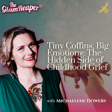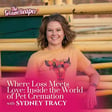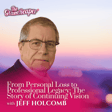
The Complexity of Grief: A Personal Reflection
Sweta Vikram, a renowned Author, Doctor of Ayurveda, Speaker, and Professor, sits down with Jennifer, The Glam Reaper to discuss grief and the profound journey to healing.
Sweta shares her personal experiences of losing her father and father-in-law, offering an intimate look at the initial stages of mourning. The discussion highlights the significance of treating those who are grieving with compassion and understanding.
Jennifer and Sweta explore the unique nature of grief, underscoring the importance of recognizing each individual's grieving experience. They also address the impact of unresolved grief on both mental and physical health, stressing the need to avoid labeling those who are grieving as simply strong or resilient.
Tune in to understand the unique and individual nature of grief and why it’s crucial to recognize it!
Key Topics:
-Personal loss stories reveal deep emotions
-Essential ways to support grieving families
-Yoga and Ayurveda secrets for funeral directors
-Understanding unique grief reactions at funerals
-Hidden dangers of unresolved grief in the funeral industry
Quotes From The Episode:
"The grief also brings around this dark side in us. No one talks about that, because the world we live in, we are just supposed to discuss highlighted reels of our lives"
- Sweta Vikram
"Often times a stranger can be more kind to you and your grief space, where you're in your grief than your friends and your family"
- Jennifer Muldowney
Timestamp:
[00:00] Podcast Intro
[03:42] Sweta shared her personal experience of losing her father and father-in-law.
[06:23] Jennifer highlighted the importance of treating people who are grieving.
[08:48] Sweta emphasized the transformative impact of Yoga and Ayurveda on mental self-reliance.
[11:41] Jennifer discussed the importance of recognizing the unique and individual nature of grief.
[14:31] Jennifer and Sweta talk about the impact of unresolved grief on mental and physical health.
[17:59] Sweta stressed the importance of not labeling those who are grieving as strong or resilient.
[20:46] Jennifer delves into the importance of self-care and clear communication in dealing with grief.
[24:53] Jennifer and Sweta highlighted the importance of preserving the memory of loved ones through actions.
[30:06] Sweta shared insights from her book "The Loss that Binds Us”.
[35:53] Outro
Connect with Sweta Vikram:
LinkedIn - linkedin.com/in/swetavikram
Website - swetavikram.com
Instagram - @swetavikram
Twitter/X - @swetavikram
Connect with Jennifer/The Glam Reaper on socials at:
Facebook Page - Memorials
https://www.facebook.com/MuldowneyMemorials/
Instagram - @muldowneymemorials
Email us - glamreaperpodcast@gmail.com
Listen to The Glam Reaper Podcast on Apple Podcasts:
https://podcasts.apple.com/us/podcast/the-glam-reaper-podcast/id1572382989?i=1000525524145
YouTube - https://www.youtube.com/channel/UCWe3sNoPny6UsMGYoYDeXfw



















